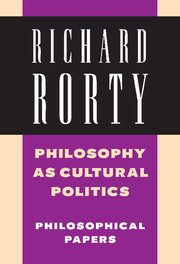Book contents
- Frontmatter
- Contents
- Preface
- Acknowledgments
- I RELIGION AND MORALITY FROM A PRAGMATIST POINT OF VIEW
- 1 Cultural politics and the question of the existence of God
- 2 Pragmatism as romantic polytheism
- 3 Justice as a larger loyalty
- 4 Honest mistakes
- II PHILOSOPHY'S PLACE IN CULTURE
- III CURRENT ISSUS WITHIN ANALYTIC PHILOSOPHY
- Index of names
3 - Justice as a larger loyalty
Published online by Cambridge University Press: 05 June 2012
- Frontmatter
- Contents
- Preface
- Acknowledgments
- I RELIGION AND MORALITY FROM A PRAGMATIST POINT OF VIEW
- 1 Cultural politics and the question of the existence of God
- 2 Pragmatism as romantic polytheism
- 3 Justice as a larger loyalty
- 4 Honest mistakes
- II PHILOSOPHY'S PLACE IN CULTURE
- III CURRENT ISSUS WITHIN ANALYTIC PHILOSOPHY
- Index of names
Summary
All of us would expect help if, pursued by the police, we asked our family to hide us. Most of us would extend such help even when we know our child or our parent to be guilty of a sordid crime. Many of us would be willing to perjure ourselves in order to supply such a child or parent with a false alibi. But if an innocent person is wrongly convicted as a result of our perjury, most of us will be torn by a conflict between loyalty and justice.
Such a conflict will be felt, however, only to the extent to which we can identify with the innocent person whom we have harmed. If the person is a neighbor, the conflict will probably be intense. If a stranger, especially one of a different race, class, or nation, it may be considerably weaker. There has to be some sense in which he or she is “one of us,” before we start to be tormented by the question of whether or not we did the right thing when we committed perjury. So it may be equally appropriate to describe us as torn between conflicting loyalties – loyalty to our family and to a group large enough to include the victim of our perjury – rather than between loyalty and justice.
Our loyalty to such larger groups will, however, weaken, or even vanish altogether, when things get really tough.
- Type
- Chapter
- Information
- Philosophy as Cultural PoliticsPhilosophical Papers, pp. 42 - 55Publisher: Cambridge University PressPrint publication year: 2007
- 12
- Cited by



